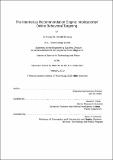The Internet as recommendation engine : implications of online behavioral targeting
Author(s)
Smith-Grieco, Anthony Nicoll
DownloadFull printable version (583.0Kb)
Other Contributors
Massachusetts Institute of Technology. Technology and Policy Program.
Advisor
David D. Clark.
Terms of use
Metadata
Show full item recordAbstract
This thesis discusses the economic implications of Internet behavioral advertising, which targets ads to individuals based on extensive detailed data about the specific websites users have visited. Previous literature on behavioral advertising has focused almost exclusively on privacy issues; there has been less study of how it might affect industry structure. This thesis examines which parties in the online advertising value chain would benefit the most from the demand for detailed behavioral data; in particular, it examines whether aggregators (such as advertising networks) that track behavior across a large number of websites would derive the greatest benefit. Qualitative stakeholder analysis is used to identify the strengths and weaknesses of several categories of actors: advertisers, advertising agencies, publishers, advertising networks, advertising exchanges, Internet service providers, and users. Advertising agencies might attempt to bypass networks and work directly with publishers, becoming aggregators in their own right. Publishers might need to become interactive "information experiences" in order to collect valuable behavioral data. Users might demand more transparency about what is happening with their data, or even more control over the data collection process. Overall, agencies, networks, and advertising exchanges appear to be in the best position; publishers are faced with a harder task. Furthermore, behavioral targeting may not result in a dramatic increase in overall online advertising spending.
Description
Thesis (S.M. in Technology and Policy)--Massachusetts Institute of Technology, Engineering Systems Division, 2010. This electronic version was submitted by the student author. The certified thesis is available in the Institute Archives and Special Collections. Cataloged from student submitted PDF version of thesis. Includes bibliographical references (p. 70-72).
Date issued
2010Department
Massachusetts Institute of Technology. Engineering Systems DivisionPublisher
Massachusetts Institute of Technology
Keywords
Engineering Systems Division., Technology and Policy Program.